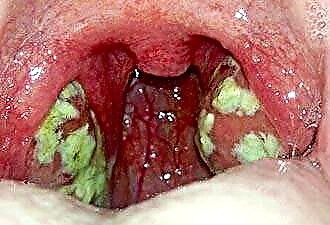Angina is an infectious disease that can be caused by various bacteria, viruses or fungi. The most common was angina, the causative agent of which is streptococcus. It is this bacterium that, under favorable conditions for it, begins to multiply, causing chills, sore throat and fever in the human body. Often the symptoms of sore throat are similar to those of the flu or an acute respiratory viral infection, however, looking at the tonsils, the doctor is not mistaken. The enlarged tonsils and white plaque on them will not make it possible to make a wrong diagnosis.
The nature of the disease
This disease is widespread among people, so there are many versions regarding whether angina is contagious.
- The first version, which is nothing more than a myth, says that angina is similar to common colds, that is, it can manifest itself as a result of low air temperature, provoking excessive cooling of the body, or as a result of the abuse of ice drinks. But is it possible to get sore throat in this way? Of course not. Indeed, in order for a disease to arise, it is necessary that a bacterium is present in the body. While various unfavorable factors will only contribute to its activation.
Important! If there is no streptococcal or staphylococcal infection in the body, hypothermia cannot cause sore throat.
- Some believe that it is impossible to get infected from a sick person. After all, the main factor affecting the onset of the disease is a weakened immune system and an improper lifestyle. However, those who go in for sports, practice hardening and eat a balanced diet are not at all insured against this infection. Indeed, angina is often contagious for perfectly healthy people who have been in contact with the patient without using proper safety measures.
Therefore, if you still doubt whether angina is contagious, I can upset you that the chances of getting sick are quite high, both in adults and in children. Of course, people with weakened immunity, as well as children, are most often infected. After all, their immune system is not perfect and is not adapted to various infections. Moreover, the transmission of the virus occurs both by airborne droplets and by means of household items that have been touched by a patient who is in the acute stage of the disease, in the presence of an elevated temperature.
Ways and causes of disease transmission
 Now you know if sore throat is contagious. But why? How does the virus enter the human body? The reason is that angina is an infectious disease, most often caused by streptococci. It is known that these bacteria can be transmitted from person to person in two ways: by airborne droplets and by household.
Now you know if sore throat is contagious. But why? How does the virus enter the human body? The reason is that angina is an infectious disease, most often caused by streptococci. It is known that these bacteria can be transmitted from person to person in two ways: by airborne droplets and by household.
Thus, if there is a person in your environment who has symptoms similar to those caused by a streptococcal infection, it is better to limit communication with him, if possible, or wear a gauze bandage. After all, the virus, which is the causative agent of sore throat, is contained in high concentration in the patient's saliva, which provokes its airborne spread when sneezing or coughing.
Why does the infection occur?
There are many arguments answering the question of whether angina is contagious. Let's find out if sore throat is transmitted in some other way, besides airborne droplets and household, or not.
As noted above, angina is a dangerous disease, the virus is especially terrible for children and the elderly. Therefore, you should take care not to get into the risk zone and not check for yourself whether the sore throat is contagious.
Several factors can be distinguished, the presence of at least one of which can significantly increase the likelihood of a disease:
- hypothermia. With a sharp decrease in ambient temperature, especially in the autumn-winter period, the amount of hypothermia increases. Of course, hypothermia in itself cannot cause a sore throat, but it can significantly weaken the body's ability to resist bacteria, which will lead to further illness.
- weakened immunity. There can be many reasons for a malfunction of the immune system. This is a lack of vitamins, unhealthy diet and a passive lifestyle. All this is the reason that the immune system weakens, and the body is no longer able to fight the infection. The lack of essential nutrients and walks in the fresh air affects the immunity of children especially acutely.
- direct transmission of the virus from the patient. It should be noted that this disease is rarely accompanied by symptoms such as a runny nose and cough, that is, in fact, there are no ways of spreading the infection by airborne droplets, because it is with saliva that the bacterium is transmitted most often. The personal belongings of the patient, especially the dishes, are a great threat. Therefore, there can be not the slightest doubt about whether sore throat is contagious to others.
Important! After contact with a carrier of the disease, be sure to treat your hands with an antiseptic or wash with soap!
Alternative routes of infection
In order to be convinced of how contagious sore throat is, there are several more ways that infection can enter the human body, which many of us have not even thought about.
After all, you can get infected through food. The thing is that staphylococcal infection can be present in dairy products, for example, in cottage cheese or milk, as well as in raw meat, vegetables and even jam.
Important! Do not buy products at spontaneous markets, they can be carriers of dangerous staphylococcus aureus!
Also, do not forget that almost every human body has its own microflora, which is located on the mucous membrane of the larynx. It is there that both streptococci and staphylococci are constantly found. Moreover, they do not pose a threat to the body and do not require special treatment. However, factors such as overwork, stress, etc. can create favorable conditions for harmful bacteria, which will allow them to attack the body and provoke a sore throat.
Prophylaxis
How to make sure that we do not have to treat a sore throat, fight against fever and general malaise? Let's formulate the main points for the correct prevention of the disease.
- You should not contact people who have all the symptoms of the disease - hoarseness, malaise, fever, sore throat. Especially keep children away from sick children. There is no need to communicate with those who are in the acute phase of the disease.
- Do not neglect the generally accepted rules of personal hygiene: do not use someone else's dishes, someone else's toothbrush, towel, etc.

- After suffering colds that could weaken the immune system, avoid visiting crowded places.
- If there is no urgent need to visit the patient, limit yourself to a phone call, observe quarantine until he has at least a normal body temperature.
- Proper nutrition, a healthy and active lifestyle are often the key to strong immunity.
- Timely and correct treatment of tonsillitis will help to avoid sore throats in the future.
Important! Walking in the fresh air can strengthen the immune system and significantly reduce the likelihood of illness.
However, it should be understood that even properly carried out prophylaxis cannot guarantee that the disease will not manifest itself.However, following these simple rules can significantly reduce the likelihood of infection.
It is especially important to deal with the prevention of the disease in children. Veda angina is a dangerous complication that most often manifests itself in the fragile body of a child. There is nothing more important than the health of a child!
Let's draw conclusions.
- Direct communication and contact with the patient increases the likelihood of infection.
- After starting antibiotic therapy, the person is still infectious for several days. Therefore, you can safely communicate with him only after normalization of the temperature and general condition.
- If you have sore throats more often than once a year, you need to pay attention to the treatment of chronic tonsillitis, perhaps it is he who provokes the disease.




